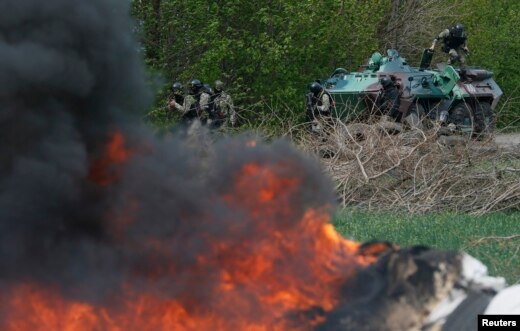
Ukrainian security force officers are deployed at a checkpoint set on fire and left by pro-Russian separatists near Slovyansk, April 24, 2014.
Fighting between Ukrainian security forces and pro-Russia militants in eastern Ukraine has left at least five militants dead, with Russian President Vladimir Putin calling it a "crime" and threatening “consequences.”
Ukraine's Interior Ministry said Thursday that its forces, together with army units, had killed five pro-Russia militants and destroyed three of their checkpoints in the eastern city of Slovyansk.
Separately, Ukrainian officials said that police had driven pro-Russia separatists out of the city hall in the eastern city of Mariupol, and that an attack by armed separatists on an army base in the town of Artemivsk had been repelled.
Kyiv earlier this week relaunched an "anti-terrorist" operation against armed pro-Russians who have taken over government buildings in about a dozen eastern cities and towns. Some of the separatists are demanding the right to vote on whether to secede from Ukraine and join Russia.
Ukraine’s government, along with the U.S. and others in the West, sees an undercover campaign by Russia aimed at creating a pretext for possible incursion followed by a Crimea-style annexation of some regions.
Under an international accord signed in Geneva last week, illegal armed groups, including the militants occupying about a dozen public buildings in Ukraine's largely Russian-speaking east, were supposed to disarm and disband.
Russia starts drills
Russia started military drills near the border with Ukraine on Thursday in response to operations by Ukrainian forces against pro-Russian separatists and NATO exercises in eastern Europe, Defense Minister Sergei Shoigu was quoted as saying.
“If this military machine is not stopped, it will lead to greater numbers of dead and wounded. Planned exercises by NATO forces in Poland and the Baltic countries do not foster normalization of the situation surrounding Ukraine either.... We are forced to react to such a development…,” the Interfax news agency quoted Shoigu as saying.
The minister said that starting on Thursday, battalions of tactical groups would begin exercises in regions of Russia bordering Ukraine. According to Shoigu, the drill will also involve the air force.
Meanwhile, the Pentagon says it has noticed Russian troop movement along Ukraine's border but added that it was "too soon to tell exactly what it is," according to a U.S. Defense Department spokesman.
Obama warns of new sanctions
Earlier, U.S. President Barack Obama, speaking to reporters Thursday in Tokyo, Japan, accused Russia is not abiding by the Geneva agreement to ease the crisis in Ukraine, saying he is not hopeful Moscow will cooperate.
He said Russia has chosen not to take the "wise path" and faces stronger sanctions, adding that Ukraine has been taking the concrete steps agreed to last week in Geneva, including offering amnesty to pro-Russian separatists who leave the buildings peacefully.
Obama said new sanctions are “teed up” but did not specify when they could be applied, saying only that it was a matter of days, not weeks.
So far, the United States and EU have imposed visa bans and asset freezes on a number of Russians in response to Moscow's annexation last month of Ukraine's Crimean peninsula.
Russia reacts
In St. Petersburg, President Putin said that if the authorities in Kyiv have in fact begun using the army in eastern Ukraine, then they are committing "a very serious crime against their own people."
“It is just a punitive operation and it will, of course, incur consequences for the people making these decisions, including [an effect] on our interstate relations,” Putin said Thursday in a televised meeting with regional media.
The developments also put into question the legitimacy of presidental elections in Ukraine scheduled for May 25, Reuters quotes Putin as saying.
Separately, Russian Foreign Minister Sergei Lavrov Thursday accused the United States of trying to orchestrate a "color revolution" in Ukraine. He said Washington is using Ukraine as a pawn in a geopolitical game.
Lavrov said the West is acting like winners of the Cold War and do not consider Russia's interests when drawing up European policies.
Moscow also flexed its economic muscles in its worst stand-off with the West since the Cold War, with the government suggesting foreign firms which pull out of the country may not be able to get back in, and a source at Gazprom saying the gas exporter had slapped an additional $11.4 billion bill on Kyiv. That is in addition to the $2.2 billion Gazprom says Kyiv already owes.
|
|
